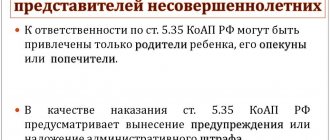Home » Buying and selling an apartment » Extract from the apartment of a minor child
Often there is a need to check out of the apartment. If adults make such decisions themselves, then parents/guardians make them for children. Moreover, permission from the guardianship authorities is often required, without which discharge becomes impossible. Let's take a closer look at this procedure and its features.
Is it possible to expel a minor child from an apartment?
The question of whether the owner, if there are good reasons, can discharge a person who has not reached the age of majority, and if so, how, interests many people. Unfortunately, there is no clear answer to this; it all depends on the grounds for the emergence of housing rights and on a number of other related circumstances.
From the municipal
If the person being discharged or his parents do not own any other housing, the guardianship authority will refuse, since the minor did not exercise the legal right to participate in privatization, after which part of the living space would be at his disposal.
From privatized
Extracting from private property is also not an easy procedure. For example, if on the day of privatization a minor was already registered there, but his legal representative decided not to include the child in privatization, the latter is given the right to live in the apartment for life.
Is it possible to discharge a child to nowhere?
According to the current legislation, citizens can be discharged “to nowhere” only upon reaching the age of 18, but if he is the owner of this living space, then sometimes, in the event of its sale, a minor can be deregistered “to nowhere.” And then only with the permission of the guardianship authority and on the condition that the proceeds from the transaction will be credited to the child’s personal account and subsequently spent specifically on housing. In practice, consent to such manipulations is given very rarely.
What is needed to discharge a child? Do I need to go to court?
If there is a need for discharge, and parents or legal representatives do not object, you need to obtain permission for this procedure from the guardianship and trusteeship authorities, and then contact the territorial department of the Department of Internal Affairs of the Ministry of Internal Affairs of the Russian Federation and write a corresponding application.
If the registered representatives consider the owner’s demand to be unfounded and do not agree to voluntarily deregister with the child, then, with the support of a qualified lawyer, you must defend your legitimate interests in court.
General rules and conditions for the child’s discharge
There are a number of rules that every person who decides to initiate the discharge of children should know:
- children are always registered and discharged together with one of the parents or with a legal representative, who can be, for example, grandmothers;
- before starting the procedure, you must obtain the consent of the guardianship authority (if you are denied guardianship, you can appeal this decision in court);
- when, when the parents divorce, the child remains to live with one of them, the consent of the other is required for discharge;
- compulsory procedure is possible only by court;
- after deprivation of parental rights, the child retains the property right to the residential property in which he is registered;
- The law prohibits discharging a child “to the street”; deregistration of minors at the place of residence is possible only with the simultaneous registration of the person being discharged in a new place, and the apartment to which he is moving must be no worse in size and level of amenities than the previous one.
Is it possible to deregister?
Mom without baby
The mother is allowed to leave the apartment only if the child remains registered with the father. Deregistration of the mother can be carried out on her own initiative or by the magistrate court on the initiative of the property owner.
The procedure for discharging a woman through the court must be preceded by the following events:
- the woman permanently resides at a different address;
- the housing belongs to strangers;
- it is planned to sell the apartment;
- the owner of the property wants to leave only the child and his father registered, without the mother.
With baby
It is worth noting that this is not so simple, since the state does not allow children to be left without a specific place of residence. In fact, they can only do this voluntarily in order to register elsewhere.
In some situations, it is still possible to carry out this procedure in court. Extract is possible in the following cases:
- A woman and her child live for a long time in another place.
- The child and his mother own real estate in which they can register and live.
- The owner wants to sell the property, but he is not a close relative of those being deregistered.
A child can only be discharged to a living space no worse than the existing one.
Children's rights in this case are protected:
- Decree of the Government of the Russian Federation “On the rules of registration and deregistration” No. 512 of 04/23/1996.
- Decree of the Government of the Russian Federation “On approval of the Rules for registration and deregistration of citizens of the Russian Federation at the place of stay and place of residence within the Russian Federation” No. 713 dated July 17, 1995.
Find out whether a father can remove a child from an apartment without obtaining the mother's consent!
Father
The child's father is deregistered after his divorce from his wife, but only when the living space is not owned by the father and the child remains registered with the mother.
Important! When housing is jointly owned by spouses, even after a divorce it is impossible to deprive the father of his registration without his desire.
Instructions for discharging a child from a privatized apartment
There is a certain sequence of actions, following which you can easily discharge a minor, but only on the condition that your actions do not violate the legal rights and interests of the person being discharged.
Extrajudicial procedure
The procedure for discharging a child from privatized housing will vary somewhat depending on whether the minor is the owner or is simply registered there.
The child is the owner of the apartment
First of all, you need to collect a package of documents and obtain permission from the guardianship and trusteeship authorities.
Guardianship must be provided:
- a certificate about all persons living with the child;
- proof of home ownership;
- passport from the BTI of current housing;
- passport from the BTI of the housing to which you plan to move;
- passports of mother and father;
- birth certificate of the person being discharged;
- a duly completed application.
It may take a maximum of 2 weeks for the guardianship authority to verify the authenticity of the documents and consider the application; after this time, a decision must be made.
Then you can begin the transaction of buying and selling a home. After transferring title to the buyer, the child's parent or legal representative must initiate the release.
To do this, you need to bring a corresponding application to the passport office with a package of the following documents attached to it:
- applicant's passport;
- birth certificate of the person being discharged;
- certificates from guardianship authorities;
- certificate of ownership of the apartment.
Note! If the child is under 14 years old, the parents are required to write an application on his behalf; if the minor has already received a passport, then he has the right to write an application on his own, but his legal representatives must certify it.
Deregistration with subsequent registration at a new place of residence by the Department of Internal Affairs of the Ministry of Internal Affairs will be carried out quite quickly - within 3 working days.
The child is not the owner of the apartment
This option does not require obtaining permission for discharge from the guardianship and trusteeship authorities; it is enough to simply submit the application and all the documents from the list below to the passport office.
Required package of documents:
- statement;
- passports of parents or legal representative;
- birth certificate of the person being discharged;
- departure sheet;
- passport from the BTI for new housing.
To avoid problems with the law, parents are required to register their child at their new place of residence within 7 days. You can read more about penalties for violating registration deadlines in this article.
Judicial order
If the parents do not want to be discharged with the child voluntarily and if there are sufficient grounds for forced discharge, the owner or other interested person may apply to the court to protect their interests.
To do this, it is necessary to correctly draw up a statement of claim, attach the necessary documents to it and take everything to the district court of general jurisdiction at the location of the disputed object.
One of the parents or legal representative acting on behalf of the minor should be indicated as the defendant in the application. If the child is already 14 years old at the time of the court hearing, his presence at the trial is mandatory.
Statement of claim
The statement of claim must contain the following information:
- name of the judicial authority;
- Full name and contact details of the plaintiff (address, telephone);
- Full name and contact details of the defendant (address, telephone);
- the reason why there was a need to discharge the minor;
- specific facts of violation of the property rights and interests of the plaintiff, which he can document;
- a request to the court to satisfy the requirements for the forced discharge of a minor;
- list of attached documents.
Documents required for the court:
- receipt of payment of state duty (for 2021 its amount is 300 rubles for citizens and 6,000 rubles for legal entities);
- extract from the house register;
- documents, audio and video files that can confirm the plaintiff’s words.
All cases of the discharge of minor children are considered with the participation of a third party - the prosecutor.
Deadlines
- 5 days are given to review the application and accept it for work.
- The trial will last a maximum of 2 months.
- If the court satisfies the plaintiff’s demands, the defendants will be given exactly one month to be discharged, search for an alternative place of residence and voluntarily move, after which, at the plaintiff’s request, they can be forcibly evicted by officers of the FSSP of the Russian Federation. You can read more about court-ordered eviction in our article.
What documents will be needed?
How to leave an apartment with a child? Suppose the mother herself agreed to deregister. To do this, she needs to visit the passport department of the Management Company or the internal affairs department and provide the following papers :
- your general passport;
- birth certificate of a son or daughter;
- statement;
- consent of the second parent (if the mother and father do not live together).
The latter document is not strictly required, but it is still preferred . The fact is that if it is not provided, then the internal affairs bodies will, of course, satisfy the request, but the second guardian, getting angry, may declare that the child’s living conditions have worsened.
Or you are deliberately interfering with his responsibilities as a parent. This could mean the start of a new lawsuit.
.
Instructions for discharging a minor child from a municipal apartment
The guardianship authority will allow the minor to be discharged only if two conditions are met:
- after deregistration, the child will immediately be registered at the new place of residence (one of the parents or a legal representative must be registered with him);
- the new apartment will have no worse living conditions and no less area than the previous one.
In all other respects, the procedure is almost no different from the discharge of a minor owner from a privatized apartment. Only the necessary package of documents for the guardianship authority should be supplemented with a social tenancy agreement.
If the minor is not the owner
When discharging a child from an apartment or house for whom property rights have not been registered, the consent of social services is no longer necessary. In this case, the child is discharged according to the standard procedure. One of the parents or legal representatives must appear at the passport office at the location of the apartment and write an application on behalf of the minor requesting deregistration.
Children who are already fourteen years old can complete the documentation themselves, however, with the permission of their parents or guardians.
The application for discharge must be accompanied by a technical passport for the new home, an identification document of the parent, and a birth certificate or passport of the minor. Officials are required to review the application within three days, after which the child will be discharged.
If a child is deregistered from a municipal apartment, he must be provided with living conditions that are no worse than in his current home. For example, if a minor previously lived in an isolated apartment, and then they decided to register him in a communal apartment or in a dormitory, where the area allocated to him is smaller than what was previously, the registration at the new place of residence will be canceled, after which the child will be restored to the old address.
If the new conditions are better or at least the same as the previous ones, it is necessary, first of all, to take an extract from the passport office, which states that the child lives with his parents. To do this, in addition to a passport and birth certificate, you will need a social tenancy agreement, then you should contact the guardianship and trusteeship authority with the documents. The complete package of documents is as follows:
• identification documents of both parents or legal representatives;
• social rental agreement;
• birth certificate of a minor;
• an agreement to purchase an apartment where the child will live, or a new social tenancy agreement;
• certificate of persons registered in the apartment;
• personal account, which must be obtained from the accounting department;
• technical passports of both the old and new place of residence.
Two weeks later, having examined the documents (unless, of course, the interests of the child are infringed upon according to these documents)
, the guardianship authority will issue permission to discharge the child, after which the necessary procedures can already be carried out at the passport office.
There are situations when it is necessary to discharge a child from an apartment, but new housing has not yet been purchased. In this case, you need to open a special account and make sure that there is an amount on it that would be enough to purchase the square meters allocated to it, and then provide the corresponding confirmation received from the bank.
Can they refuse to discharge children?
There are situations when the discharge of even a child temporarily registered in an apartment will be refused not only by the guardianship authorities, but also by the court. For example, in these:
- deregistration of a child and his subsequent registration in an apartment with worse living conditions;
- discharge of a minor “to nowhere.”
If guardianship officials “accidentally” do not monitor compliance with these rules and allow a discharge that violates the legal rights and interests of the child, any interested person can appeal the decision of the negligent employee in court.
Arbitrage practice
Each such case involving minors is considered individually, and a decision is made after a detailed analysis of the circumstances surrounding deregistration. As an example, let's look at a case where a child was nevertheless discharged by the court, although he did not own any real estate.
Example. Taking advantage of the State Program “Young Family”, the Tsvetkovs received an apartment in an apartment building under a social tenancy agreement. But after starting to complete the paperwork, the happy family discovered that the previous tenants were still registered in this living space - a mother and her minor child, although in fact the premises had been empty for more than eight years. The internal condition of the housing was very poor - glass was missing almost everywhere, there were no interior doors, and the wiring had long since broken down.
After the former tenants were found and officially notified that new tenants were moving in, they did not agree to check out voluntarily and asked the Tsvetkovs for an impressive sum of money for refusing to register.
The latter had no choice but to go to court to discharge the former residents without the latter’s consent. The Tsvetkovs listed several facts in their statement of claim as grounds for eviction of the defendants:
- mother and child do not live at their place of registration for a long time;
- more than eight years of rent arrears have accumulated;
- Due to the fault of the previous residents, the condition of the apartment fell into disrepair.
After considering all the circumstances and evidence in the case, the claim was satisfied, and the defendants were successfully discharged by the Department of Internal Affairs of the Ministry of Internal Affairs on the basis of a court order within a few days.
Where is this done? Where will you need to go?
Everything will depend on how the owner and residents feel about it. If everything is peaceful and everyone has agreed, then the child’s mother needs to be discharged from the apartment at the passport department of the Management Company or the Department of Internal Affairs .
You can also use the Multifunctional Center or the State Services website. In this case, a visit from the mother and a minimal set of documents is enough; you don’t even need the consent of the board of trustees.
If the mother actively protests against the discharge, and you do not know how to discharge your ex-wife and child from the apartment, then there is only one way out - to go to court . True, it is not a fact that he will help either - for example, if the apartment is municipal, then the judge will most likely reject the claim, since the small citizen is a participant in privatization.
But even if neither the mother nor the child are co-owners of the home, it is not a fact that they will be discharged immediately. Yes, there will be no need to involve the board of trustees, but the judge will definitely be concerned with the question: is there somewhere for both of them to go? After all, we are talking, let’s not forget, about the Constitutional human right to housing (Article 40).
And if it turns out that it is not, the judge will at least give a deferment to resolve the housing issue. Or it may happen that they will leave them as tenants.
That is, it turns out that even if the citizen and the child are not co-owners of the home and do not want to be discharged, even the court may lean on their side.
How to discharge a mother and child from an apartment without going to court? There is also a workaround for solving the problem, without courts .
The owner of the apartment can simply sell it at a loss in value (due to encumbrance) and use the proceeds to buy another home.
The new owner will first ask unnecessary people to leave voluntarily, and if they don’t want to, he will discharge them by court order , only now there will be no need to wait for leniency, since there has been a change in the owner of the residential premises (Article 292 of the Civil Code). Now you will not need to wonder how to leave the apartment with children, since this will happen automatically voluntarily or through the courts.







